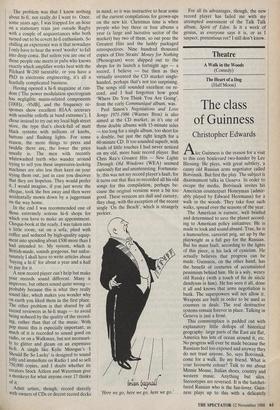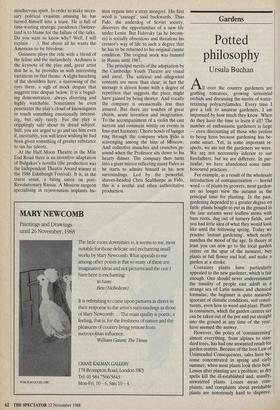Theatre
A Walk in the Woods (Comedy) The Heart of a Dog (Half Moon)
The class of Guinness
Christopher Edwards
Alec Guinness is the reason for a visit to this cosy boulevard two-hander by Lee Blessing. He plays, with great subtlety, a canny old Russian arms negotiator called Botvinnik. But first the play. The subject is disarmament talks in Geneva. In order to escape the media, Botvinnik invites his American counterpart Honeyman (admir- ably played by Edward Herrmann) for a walk in the woods. They take four such walks, spread over the seasons of the year.
The American is earnest, well briefed and determined to save the planet accord- ing to American policy initiatives. He is made to look and sound absurd. True, he is a humourless, careerist prig, set up by the playwright as a fall guy for the Russian. But his main fault, according to the lights of this piece, is his lack of cynicism. He actually believes that progress can be made. Guinness, on the other hand, has the benefit of centuries of accumulated pessimism behind him. He is a wily, weary old Russky (with a touch of fin de siècle dandyism in him). He has seen it all, done it all and knows that arms negotiation is bunk. The superpowers will not allow it. Weapons are built in order to be used as counters in deals. The real destructive systems remain forever in place. Talking in Geneva is just a front.
This commonplace is padded out with explanatory little dollops of historical geography: large parts of the East are flat, America has lots of ocean around it, etc. No progress will ever be made because the Russians feel too exposed and anyway they do not trust anyone. So, says Botvinnik, come for a walk. Be my friend. What is your favourite colour? Talk to me about Minnie Mouse, Italian shoes, country and western music. Anything but silos. Stereotypes are reversed. It is the hatchet- faced Russian who is the fun-lover. Guin- ness plays up to this with a delicately mischievous spirit. In order to make neces- sary political evasions amusing he has turned himself into a tease. He is full of time-wasting strategic paradoxes (Switzer- land is to blame for the failure of the talks. Do you want to know why? Well, I will explain . . .). But above all he wants the American to be frivolous.
Guinness plays the role with a blend of the feline and the melancholy. Archness is the keynote of the play and, great artist that he is, he provides us with interesting variations on that theme. A slight hunching of the shoulders here, a narrowing of the eyes there, a sigh of mock despair that suggests true despair below. It is a beguil- ing demonstration, always diverting and highly watchable. Sometimes he even penetrates the play's cloud of knowingness to touch something emotionally interest- ing, but only rarely. For the play is cripplingly safe about its dread subject. Still, you are urged to go and see him even if, inevitably, you will leave wishing he had been given something of greater substance to tax his talents.
At the Half Moon Theatre in the Mile End Road there is an inventive adaptation of Bulgakov's novella (the production was the Independent Theatre Award winner at the 1988 Edinburgh Festival). It is, in the truest sense, a biting satire on post- Revolutionary Russia. A Moscow surgeon specialising in rejuvenation implants hu- man organs into a stray mongrel. His first word is 'sausage', said backwards. Thus Fido, the underdog of Soviet society, discovers the opportunities of a new life under Lenin. But Fidovsky (as he becom- es) is socially obnoxious and threatens his creator's way of life to such a degree that he has to be returned to his original canine condition. The original work was banned in Russia until 1987.
The principal merits of the adaptation by the Cambridge Youth Theatre are. visual and aural. The satirical and allegorical contents are more than clear; in fact the message is driven home with a degree of repetition that suggests the piece might have gained by being shorter. And vocally the company is occasionally less than assured. But there are touches of great charm, acute invention and imagination. To the accompaniment of a violin the cast narrate and comment wittily on events in four-part harmony. Choric howls of hunger ring through the company when rido is scavenging among the bins of Wscow. And collective munches and crunches Te- sound when the Professor sits down to his hearty dinner. The company then turns into a giant mirror reflecting many Fidos as he starts to admire himself in his new surroundings. Led by the powerful, shaven-headed Chris Sculthorpe as Fido, this is a zestful and often authoritative production.











































































 Previous page
Previous page